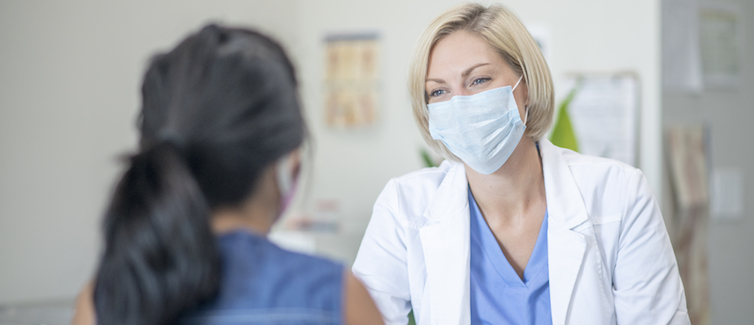Disclaimer: At UPMC HealthBeat, we strive to provide the most up-to-date facts in our stories when we publish them. We also make updates to our content as information changes. However, education about COVID-19 can shift quickly based on new data, emerging variants, or other factors. The information in this story was accurate as of its publish date. We also encourage you to visit other reliable websites for updated information, including the Centers for Disease Control and Prevention (CDC), Food and Drug Administration (FDA), and your state and local governments.
When Sharae Hopkins started feeling sick in late January, she thought it was a cold or sinus infection at first.
But as her symptoms — including body pain, muscle aches, cough, and lightheadedness — got worse, Sharae got tested for COVID-19.
It came back positive.
Sharae was worried because it was a weekend, and her primary care doctor’s office was closed. So she called UPMC and scheduled a video visit. The doctor told her she might be a candidate for monoclonal antibody therapy, a treatment authorized by the U.S. Food and Drug Administration (FDA) for COVID-19.
The treatment worked the way it should, helping cure Sharae’s illness.
“It was a complete turnaround,” she says.
Never Miss a Beat!
Subscribe to Our HealthBeat Newsletter!
Thank you for subscribing!
You can now select the specific newsletters you'd like to receive.
You are already subscribed.
Subscribe to more newsletters in our email preference center.
Sorry, an error occurred. Please try again later.
Get Healthy Tips Sent to Your Phone!
‘I Didn’t Know What Else Would Make a Difference’
Monoclonal antibodies are a promising treatment for COVID-19. Scientists create monoclonal antibodies in the lab to target a specific disease-causing organism — in this case, the coronavirus.
When you get the treatment, the monoclonal antibodies act like your body’s naturally occurring antibodies. They help your body’s immune system destroy COVID-19.
The FDA issued emergency use authorization (EUA) for monoclonal antibodies as a COVID-19 treatment for outpatients who have mild or moderate COVID-19 and are at risk of the disease becoming severe. When given shortly after infection with the coronavirus, monoclonal antibodies dramatically reduce the risk of hospitalization and death.
“A one-time monoclonal antibody treatment has helped keep our patients with COVID-19 out of the hospital,” says Erin McCreary, Pharm.D., infectious diseases pharmacist, UPMC, and clinical assistant professor, University of Pittsburgh School of Medicine. “If given early to high-risk patients, this treatment works to prevent COVID-19-related complications.”
As a diabetic who is insulin-dependent, Sharae was eligible for the treatment.
“When the doctor suggested the treatment, I thought, ‘Why not?'” Sharae says. “I didn’t know what else would make a difference.”
‘I Started Feeling So Much Better’
Sharae’s monoclonal antibody treatment came two days after her positive COVID test. Although she lives on Pittsburgh’s South Side, she drove to Monroeville — about a half-hour away — for her treatment.
“They were able to get me in sooner,” she says. “I didn’t care where I had to go. It was worth the drive.”
Sharae says the staff was very attentive and explained the treatment well, answering all her questions.
“They broke every single detail down to me and explained the process so well,” she says. “I felt so confident with them.”
Patients receive monoclonal antibodies through intravenous (IV) infusion. The treatment lasts a couple of hours.
Although she felt tired after getting the treatment, Sharae says her symptoms began to improve the next day.
“I started feeling so much better,” she says. “I had my appetite back, energy back, no more cough.
“The biggest notice was with my appetite. I actually had a desire to eat.”
‘If It Can Help Someone Else, That’s All That Matters’
Within two to three days of her treatment, Sharae says she felt strong enough to go outside and be active. In the two months or so since her treatment, she has felt no side effects.
Because of how successful her treatment was, Sharae says she’s recommended monoclonal antibodies to others who might be eligible.
“I was telling everyone about it, saying, ‘You should check this out,'” Sharae says. “I definitely was trying to spread the word.”
Monoclonal antibodies have shown promise as a COVID-19 treatment. In March, UPMC reported monoclonal antibody treatments had greatly reduced the risk of hospitalization and death in our patients if given shortly after infection.
“If it can help someone else, that’s all that matters to me,” Sharae says.
If you recently tested positive for COVID-19 and want to know if you qualify for monoclonal antibody treatment, call your doctor or 866-804-5251. To learn more about the treatment, including who is eligible, visit UPMC.com/AntibodyTreatment.
About UPMC
Headquartered in Pittsburgh, UPMC is a world-renowned health care provider and insurer. We operate 40 hospitals and 800 doctors’ offices and outpatient centers, with locations throughout Pennsylvania, Maryland, New York, West Virginia, and internationally. We employ 4,900 physicians, and we are leaders in clinical care, groundbreaking research, and treatment breakthroughs. U.S. News & World Report consistently ranks UPMC Presbyterian Shadyside as one of the nation’s best hospitals in many specialties and ranks UPMC Children’s Hospital of Pittsburgh on its Honor Roll of America’s Best Children’s Hospitals. We are dedicated to providing Life Changing Medicine to our communities.
